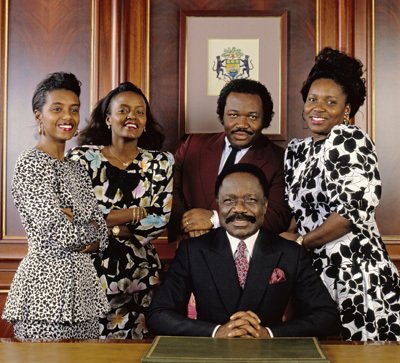One of Africa’s wealthiest presidents said this week that he was giving up at least some of his holdings “to the people of Gabon,” a declaration heralded by his inner circle but quickly met with skepticism by critics who pointed out the legal and political pressure the leader, Ali Ben Bongo, is facing over the vast riches acquired by his family.
The holdings of the Bongo family have long been a subject of speculation and, for much of the last decade, a subject of legal action by the French authorities as well.
Mr. Bongo’s father, Omar, ruled Gabon for more than four decades until his death in 2009, accumulating fleets of expensive cars, luxurious properties in France and overstuffed bank accounts along the way.
Critics have long denounced the disparity between the lives of the people in a country where a third live on less than $1.25 a day and the family’s sumptuous properties in Paris and elsewhere in France, the focus of a long-running judicial inquiry.
Around 40 such houses and apartments were identified by the nongovernmental organization Transparency International, which sued Mr. Bongo’s father and other African leaders in 2008 in a case that has come to be known in France as the “ill-gotten gains affair.”
President Ali Ben Bongo of Gabon. Credit Stephanie Lecocq/European Pressphoto Agency
Late on Monday, Mr. Bongo said in a speech on national television that he was giving up “to the Gabonese” two properties in Paris; his father’s immense residence in the Gabonese capital, Libreville; and the “income from my portion of the inheritance” in order to “aid the education and development of Gabon’s youth.”
The two houses in Paris are in the Seventh and Eighth Arrondissements, two of the city’s most exclusive districts, and the home in Libreville is “gigantic,” an aide to Mr. Bongo said in a telephone interview from the Gabonese capital. The aide said the mansion would become part of a national university system that critics say is in tatters.
The unexpected donation this week comes in a fraught context for Mr. Bongo. The two Paris properties are part of the continuing “ill-gotten gains” court case in France, said William Bourdon, a Paris lawyer who has led the fight to expose several African leaders’ plundered wealth.
In addition, Mr. Bongo’s cabinet director, Maixent Accrombessi, was arrested this month by the French authorities at Charles de Gaulle Airport outside Paris as he was about to board a plane for Gabon. He was accused of receiving bribes from a French company that makes military uniforms, according to French news reports.
Mr. Bongo is also facing a potentially turbulent re-election campaign next year — his takeover from his father in 2009 was marred by violence — and revelations this year in the French news media about secret Monaco bank accounts held by his father that contain more than 30 million euros.
“There’s an immense opacity in which all these goods were acquired,” said Mr. Bourdon, the Paris lawyer. “We’ve got to be sure this isn’t just a piddling-about with an immense inheritance. This is just one declaration in a universe of opacity.”
“Is this not simply an attempt to restore tarnished credit in the face of a pressing electoral calendar?” he asked.
Mr. Bongo’s aide, Igor Nyambie Simard, said that his boss was simply looking after the interests of the country’s youth and was concerned about the “catastrophic” results of recent school tests.
“Ali Bongo is not implicated in the ‘ill-gotten gains affair,’ ” Mr. Simard said. “He doesn’t need this inheritance. Sure, he lives well. But everything he’s got, he wants to dedicate it to the youth.”
But a longtime opponent of the Bongos, repeatedly harassed by the government over the years, rejected those explanations.
“This is a demagogic decision; he’s never publicly said what the heritage of the Bongos amounts to,” the opponent, Marc Ona, a well-known environmental campaigner, said in an interview from Libreville. “He’s got to tell us how many classrooms he’s built over the years. The answer is like zero.”
“There’s a confusion between the Gabonese state and the Bongo family,” Mr. Ona added. “The state is what? Him.”


